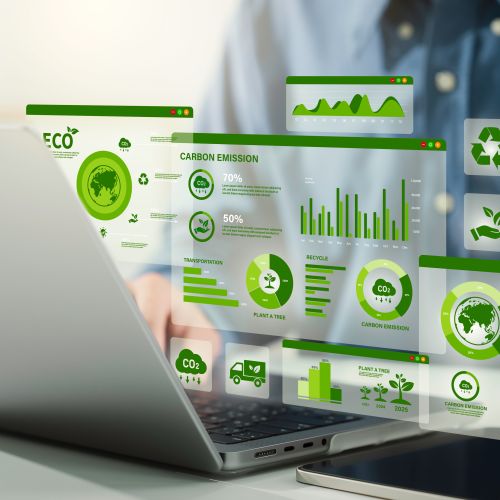Energy Sustainability & Renewable Energy Adoption: Enhancing Social Responsibility in Business
- Environmental, Social & Corporate Governance
This programme is conducted on-campus.
To use your SkillsFuture Credit, please submit your claim through our payment portal. Do not submit the claim manually via the SkillsFuture page. Please refer to our step-by-step guide here.
2 days
Day 1: 9am - 5pm
Day 2: 9am - 6pm
Singapore Management University
Who Should Attend
The programme can facilitate a multidisciplinary approach to energy sustainability and renewable energy adoption, fostering collaboration and innovation across various sectors.
- Business Leaders and Executives
- Policy Makers and Government Officials
- Energy Sector Professionals
- Corporate Social Responsibility (CSR) Managers
- Environmental Consultants and Advisors
- Academics and Researchers
- Real Estate and Urban Planning Professionals
- Non-Governmental Organisations (NGOs) and Advocacy Groups
- Investors and Financial Analysts
PREREQUISITES
Participants should have at least 2 years of working experience
Overview
While green energy has many advantages, it also has drawbacks, such as high upfront costs, intermittent power, and land use issues. Nevertheless, overcoming these challenges is crucial for a shift towards green energy, ensuring a sustainable future.
This programme covers the pivotal role of green energy in fostering sustainability and addressing environmental concerns. Participants will gain insights into its positive environmental impact and examine potential challenges associated with its adoption.

Sustainability at the heart Global Green Connect (GGC), founded in 2013, is an integrated sustainability network that combines consulting, academy, and social enterprise. Global Green Connect aims to make a positive impact on business for long-term success by focusing on authentic and practical sustainability solutions. Global Green Connect's sustainability training courses aims to equip professionals, managers, executives, and technicians (PMETs) with future-ready skills for emerging green jobs, or existing jobs that are going to be green in the future economy.
Learning Objectives
At the end of the 2-day course, participants will be able to:
- Understand the concept of renewable energy and its significance in climate change mitigation and sustainability
- Understand each renewable energy source's potential and limitations, including costs, intermittency, and land use requirements
- Recognise the role of policy and governance in green energy promotion, including subsidies, regulations, and incentives
- Develop critical thinking skills to assess the environmental and sustainability impacts of renewable energy technologies and their deployment at various scales
- Understand the potential challenges and opportunities associated with the transition to a future powered by renewable energy, including technological, social, and economic barriers
Topic/Structure
Day 1
Module 1: Introduction to Renewable Energy and Climate Change Mitigation
Topics:
- Renewable energy sources and their role in combating climate change
- Importance of renewable energy for sustainability and corporate social responsibility
- Case studies of successful integration of renewable energy into operations
- Discussion on global trends and initiatives promoting renewable energy adoption
Module 2: Potential and Limitations of Renewable Energy Sources
Topics:
- Examination of various renewable energy sources, e.g. solar energy, wind energy
- Analysis of the potential and limitations of each renewable energy source
- Innovative approaches to address limitations and enhance renewable energy efficiency
Module 3: Policy and Governance in Green Energy Promotion
Topics:
- Policies and regulations influencing renewable energy development at national and international level
- Financing green technology and renewable energy projects through green bonds, government subsidies and tax incentives
- Case studies on policy implementations and green financing as well as their impact on renewable energy adoption
Day 2
Module 4: Assessing Environmental and Social Impact
Topics:
- Critical thinking skills and methodologies to assess environmental and social impacts
- Examination of life cycle assessment, carbon footprint
- Materiality and impact of environmental and social factors on financial risk
- Potential trade-offs and synergies between environmental, social, and economic factors in projects
Module 5: Challenges and Opportunities in Renewable Energy Transition
Topics:
- Technological, social, and economic barriers to adoption of renewable energy
- Potential challenges and opportunities in renewable energy transition (e.g. technological advancements, economic implications, equity considerations)
- Case studies on innovative solutions and strategies that overcome barriers and maximise social benefits of renewable energy transition
Assessment
- Group Presentation
- Multiple Choice Questions
Participants are required to attain a minimum of 75% attendance and pass the associated assessment in order to receive a digital Certificate of Completion issued by SMU Academy.
Calculate Programme Fee
Fee Table
| EMPLOYER-SPONSORED | |||
|
PARTICIPANT PROFILE |
SELF-SPONSORED |
SME |
NON-SME |
|
Singapore Citizen < 40 years old Permanent Resident LTVP+
|
$654 (After SSG Funding 70%) |
$254 (After SSG Funding 70% |
$654 (After SSG Funding 70%) |
|
Singapore Citizen ≥ 40 years old |
$254 (After SSG Funding 70% |
$254 (After SSG Funding 70% |
$254 (After SSG Funding 70% |
|
International Participant |
$2,180 (No Funding) |
$2,180 (No Funding) |
$2,180 (No Funding) |
All prices include 9% GST
Please note that the programme fees are subject to change without prior notice.
Post Secondary Education Account (PSEA)
PSEA can be utilised for subsidised programmes eligible for SkillsFuture Credit support. Click here to find out more.
Self Sponsored
SkillsFuture Credit
Singapore Citizens aged 25 and above may use their SkillsFuture Credits to pay for the course fees. The credits may be used on top of existing course fee funding.
This is only applicable to self-sponsored participants. Application to utilise SkillsFuture Credits can be submitted when making payment for the course via the SMU Academy TMS Portal, and can only be made within 60 days of course start date.
Please click here for more information on the SkillsFuture Credit. For help in submitting an SFC claim, you may wish to refer to our step-by-step guide on claiming SkillsFuture Credits (Individual).Workfare Skills Support Scheme
From 1 July 2023, the Workfare Skills Support (WSS) scheme has been enhanced. Please click here for more details.
Employer Sponsored
Enhanced Training Support for SMEs (ETSS)
- Organisation must be registered or incorporated in Singapore
- Employment size of not more than 200 or with annual sales turnover of not more than $100 million
- Trainees must be hired in accordance with the Employment Act and fully sponsored by their employers for the course
- Trainees must be Singapore Citizens or Singapore Permanent Residents
- Trainees must not be a full-time national serviceman
- Trainees are eligible for ETSS funding only if their company's SME status is approved prior to the course commencement date. To verify your SME's status, please click here.
Please click here for more information on ETSS.
Absentee Payroll
Employers who sponsor their employees for the course may apply for Absentee Payroll here. For more information, please refer to:
AP Guide (Non-SME Companies)
Declaration Guide (SME Companies)
Loading schedule information...
*Registration will close 5 calendar days before the course start date, or once the class is full, whichever comes first.





